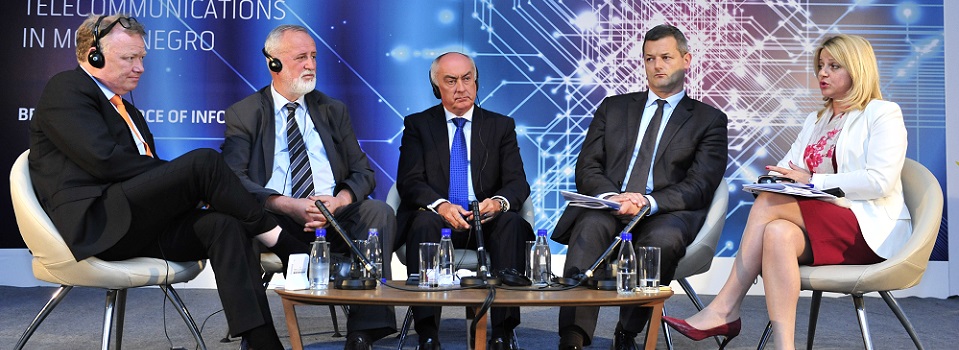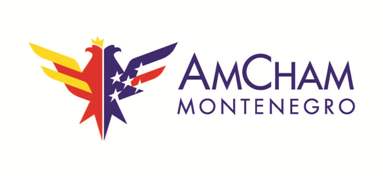
31
2015Trends in the Telecommunications Regulatory Environment
The second panel at AmCham Montenegro conference “Telecommunications in Montenegro – Contribution of Digital Economy to Society Development“ focused on the trends in the telecommunication regulatory environment in Montenegro. We are pleased to have hosted Mr. Zoran Sekulić, from the Agency for Electronic Communications and Postal Services – the Regulator, Ms. Ratka Strugar from the Ministry of Information Society and Telecommunications, Mr. Patrick Schmelzer from the Delegation of the European Union to Montenegro and Mr. Rüdiger Schulz, the CEO of Crnogorski Telekom.
The focal point of this discussion was the analysis of the current regulatory framework in the telecommunication industry in Montenegro, as well as possible solutions for improvement of the legislative in terms of attracting new investors to the market. As Mr. John Strand – the moderator of this panel – indicated, the debate is not on the side of what the Government would like to have or what the telco operators should give, but instead what we can do together to provide a better business environment and thus, contribute to society development?
The main challenge lies in the fact that the Government strongly dependents on the money coming from the taxation of telecommunication services, which represents a significant contribution to the Montenegrin budget.
“In the future, the Government should be less dependent on direct taxes from the telecommunication industry, but the telecommunication industry should instead fuel in economy which generates taxes in itself to the Government”, stressed Mr. Strand. In other words, the taxation income coming from the telco industry should go from direct to indirect sources, such as company profits etc.
When it comes to the influence of OTT (over-the-top) players, they have changed the market significantly in the last few years. As for Mr. Strand, the competition in the telco industry in the future is not on the infrastructure side, but it is on the service level. “The competition is not created among operators – but it is created with the operators on one side and OTT players on the other side”, concluded Mr. Strand.
Mr. Schmelzer, the responsible for the Chapter 10 – Information Society and Media in the EU integration process indicated that predictable business environment and friendly investment climate are of crucial importance for Montenegro. Special emphasis is being placed on the economic governance and the Rule of Law as key drivers of the economic prosperity of Montenegro and its integration to the EU family.
Ms. Ratka Strugar explained the position of the Ministry of Information Society and Telecommunications towards the implementation of the Strategy for Information Society Development in Montenegro. The dedication of the Government of Montenegro and the Ministry can be recognized through opening the Chapter 10 within the EU integration process and harmonizing the legislation (such as the Law on Electronic Communication) with the EU directives. “The Ministry is closely monitoring all trends and changes happening in this area in the EU and aligning our regulatory framework towards these changes.” said Ms. Strugar. Also, she indicated the fact that a new operator m:tel entered the Montenegrin market in 2007 and justified its existence, shows the attractiveness of this market for investments.
“It is important to create a synergetic effect with both the operators and regulators towards creating a digital Montenegro”, said Ms. Strugar.
She also stressed the progress Montenegro made in the last 10 years and announced the establishment of a National Coordination Agency comprised of representatives of regulators and operators, who will work on improving the telecommunications infrastructure.
Mr. Sekulić from the Agency for Electronic Communications and Postal Services explained that this regulator is governed by the principle of technological neutrality. He supported the joint initiative to intensify the communication between the operators and the regulators and stressed the importance of finding the examples of good practice in other countries.
One of the biggest challenges for operators is the size of Montenegro and its market. So the main challenge for regulators is, as perceived by Mr. Schulz, keeping up with the speed of changes happening in the ICT sector. Also, one of the most important issues is the predictability of the business environment, as mentioned earlier.
In the end, we have to recognize the changes happening in the overall environment, especially in the technological sector.
“We are facing a technological paradigm shift, a taxation paradigm shift and a regulatory paradigm shift.” said Mr. Strand.
Despite all the challenges that do exist in Montenegro, as well as in other countries, it was concluded that Montenegro is one of the countries which does have a positive image among countries on the EU integration path. Therefore, it is important to keep going forward toward driving the society development based on the digital economy.
This is the third and last blog post from the conference. You can also read about the conference in general, as well as about the first panel discussion “Digital Economy and Society Development”.









